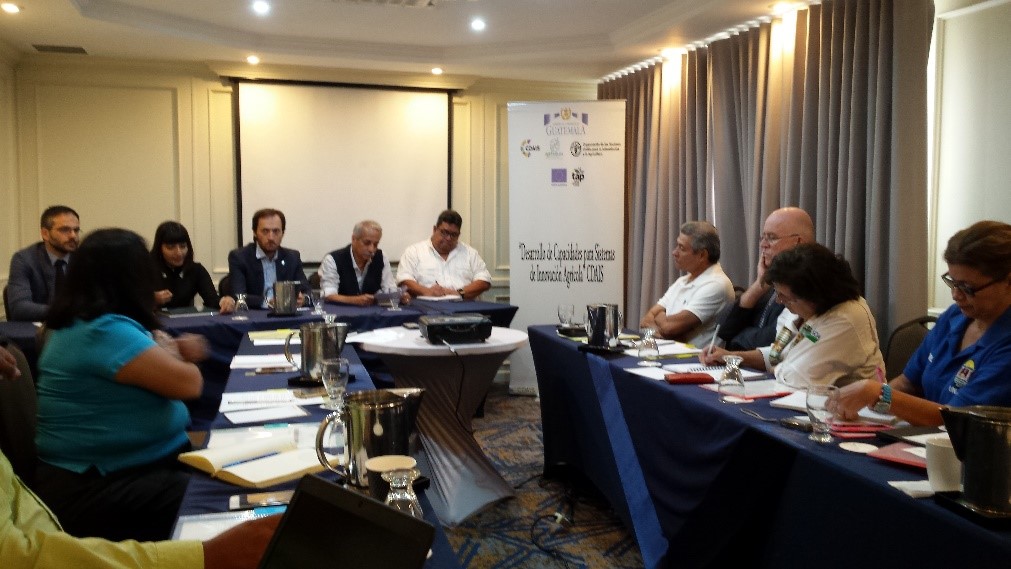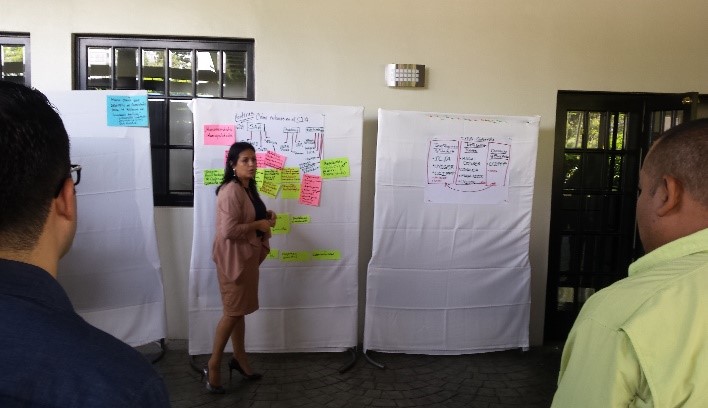
In the framework of the development of the CDAIS organizational analysis phase for the delivery of ‘innovation support services’, a workshop for facilitators from Guatemala and Honduras was held from 15 to 17 May 2018. The workshop aimed to develop skills for organizational analysis focused on bridging institutions that provide innovation support services. Participants from Guatemala included Susana García and David Valdés from the Instituto de Ciencia y Tecnología Agrícola (ICTA), Estuardo Archila from the Unidad de Vinculación y Gestión de Recursos (UVIGER), Belarmino Gómez from the Dirección Regional de Producción (DIREPRO), and Marta Velásquez from the Consejo Nacional de Desarrollo Agropecuario (CONADEA).
There were three days of work and exchange of knowledge. At the opening, José Valls, food and nutrition security representative of FAO Guatemala made a statement, as well as Erick Martinez, director of Pronagro in Honduras, Marco Cahueque of MAGA (the Ministry of Agriculture), and the Agrinatura focal points Nury Furlán and Stefano del Debbio. After words of welcome from project directors. Richard Hawkins, director of ICRA, lead the development of the first phase of the learning cycle, explaining the objective of being able to assist bridging organizations to understand their strengths and weaknesses that contribute to providing innovation support services. Participants were then invited to define in their own words, what they understood by ‘innovation support services’.
This was followed by a contextualisation and description of the different stages of organizational coaching plans, led by Nury Furlán, supported by Julio Catalán and Edgardo Navarro, CDAIS country programme managers for Guatemala and Honduras, respectively. Key points included that that learning cycles are developed to allow reflection on what is planned and executed.
This first day allowed the representatives of organizations present to identify actors and recognize services and advantages that participation of ICTA, MAGA and CONADEA will bring, in a project that stimulates agricultural innovation. The second day focused on the definition of the role and profile of the facilitator, and the design and development of an interview instrument that explores and evaluates the three domains of innovation. Communications consultant Jair Escobar facilitated the session, including an exploration of concepts, and collective construction exercises on the role and profile of the facilitator in the institutions. Participants then carried out group planning exercises for a facilitation process, and discussed which questions were important to ask, to answer the three domains of innovation. A final revision was made with the support of CDAIS consultant Omar Regalado, and on the last day, participants defined who would be the interviewees and the facilitators within the institutions they represent.
The workshop was closed by Diego Recalde, FAO representative in Guatemala, with words of encouragement to the group of participants.

